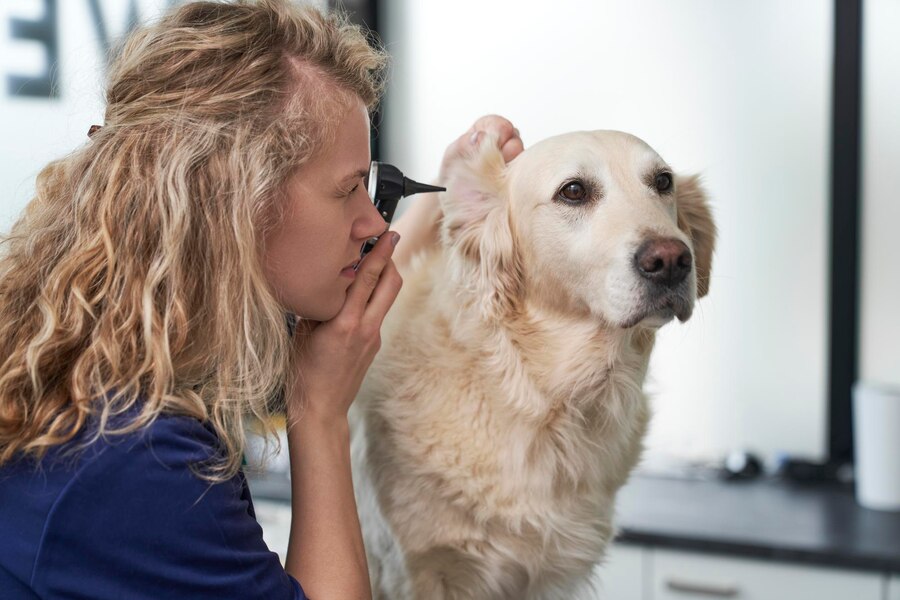Why Does My Dog Poop So Much, And What To Do About It?


If you find yourself constantly cleaning up after your furry friend, you may be wondering, “Why does my dog poop so much?” While it’s normal for dogs to have a bowel movement a few times a day, excessive pooping can be a cause for concern.
Several factors can contribute to frequent and large stool in dogs, including diet, health conditions, and medication. In this blog post, we will explore the reasons why your dog may be pooping more than usual and offer some tips on how to manage the issue.
How Often Should A Healthy Dog Poop?

The frequency of a healthy adult dog’s bowel movements can vary depending on several factors. This includes their age, diet, activity level, and individual metabolism. In general, most dogs have bowel movements once or twice a day. However, it is considered within the normal range for dogs to poop anywhere from once every few hours to once every 24-48 hours.
Puppies tend to have more frequent bowel movements. This is due to their higher metabolic rate and the fact that they are still developing their digestive systems. As they grow older, their bowel movements typically become more regular.
It’s important to remember that changes in a dog’s bowel habits can occur for various reasons. This includes dietary changes, stress, illness, or other underlying health issues. We have discussed in detail the possible reasons that can affect a dog’s bowel movement in the next section.
Why Does My Dog Poop So Much?
There can be several reasons why your dog may poop frequently. Here are some common factors that can contribute to increased bowel movements in dogs:
Diet
The type of food your dog eats plays a significant role in their bowel habits. High-fiber diets often lead to increased frequency and volume of bowel movements. Additionally, sudden changes in diet can cause gastrointestinal upset and result in more frequent pooping.
Overfeeding
Feeding your dog excessive amounts of food can overload their digestive system, leading to more frequent bowel movements. It’s important to follow the feeding guidelines provided by your veterinarian. You can also follow the instructions mentioned on the dog food packaging. This way, you can make sure you’re providing the appropriate portion size for your dog.
Poor-quality food
Low-quality or poorly digestible dog food can pass through the digestive system quickly, resulting in frequent bowel movements. It’s important to feed your dog a balanced diet that provides proper nutrition and is easily digestible.
Dietary Indiscretion
Dogs are known to explore and eat things they shouldn’t, such as garbage, spoiled food, or non-food items. These ingested substances can irritate the gastrointestinal tract, leading to increased bowel movements as the body tries to get rid of them.
Intestinal parasites
Certain parasites, such as worms, can cause increased bowel movements in dogs. If your dog hasn’t been dewormed recently or shows other signs of a parasitic infection (e.g., weight loss or poor appetite), it’s essential to consult with your veterinarian for proper diagnosis and treatment.
Medical Conditions
Some medical conditions, such as inflammatory bowel disease, gastrointestinal infections, or food allergies, can cause increased bowel movements in dogs. If you notice other signs of illness, such as vomiting, weight loss, or changes in appetite, it’s crucial to have your dog checked by a veterinarian.
When Should You Be Concerned About Your Dog Pooping A Lot?
The frequency of bowel movements can vary among dogs. However, there are certain situations where increased frequency or excessive pooping may indicate an underlying issue.
Here are some signs that you should be concerned about your dog pooping a lot:
Sudden Change
If your dog’s bowel habits have significantly changed, such as going from a normal pattern to pooping a lot, it’s worth investigating. Sudden changes can indicate a problem, especially if accompanied by other symptoms.
Change In The Poop Color
The color of the poop of a healthy dog is usually chocolate brown. This color indicates that your dog’s digestion is working properly. In addition, it also shows that there is no bleeding or infection in the gastrointestinal tract. However, slight changes in the color of your dog’s poop may be normal, depending on what they eat or drink.
But some changes in the color of your dog’s poop can be a sign of serious issues. For example, if your dog’s poop is black, maroon, red, or red-streaked, it may mean that there is bleeding in the upper or lower digestive tract. The best way to monitor your dog’s poop color and health is to check it regularly and compare it with an unhealthy dog poop color chart.
Diarrhea
Frequent loose or watery stools can be a sign of gastrointestinal upset or infection. If your dog is pooping a lot and the consistency of the stool is abnormal, it’s important to monitor their hydration level and seek veterinary attention if the diarrhea persists.
Straining Or Discomfort
If you seedog appears to be straining, experiencing pain, or showing signs of discomfort while pooping, it may indicate an issue such as constipation, obstruction, or inflammation in the gastrointestinal tract.
Blood In Stool
The presence of blood in your dog’s stool, whether it’s fresh or digested, is a worrying sign. It can be a sign of various conditions, including inflammation, infection, parasites, or more serious underlying diseases.
Weight Loss Or Poor Appetite
If your dog is pooping a lot and also experiencing weight loss or a decreased appetite, it could be a sign of a more significant health problem such as dental problems, gastrointestinal disease, cancer, etc. It can also be due to stress due to change in environment or daily routine. A veterinarian should always investigate unexplained weight loss.
Lethargy Or Other Signs Of Illness
Excessive pooping together with lethargy, vomiting, abdominal discomfort, or other signs of illness should prompt you to seek veterinary advice. These symptoms can indicate a range of medical conditions that require medical attention.
If you notice any of these signs or if you are simply concerned about your dog’s increased frequency of bowel movements, it’s best to consult with your veterinarian. They can perform a thorough examination, conduct any necessary tests, and provide a correct diagnosis and appropriate treatment plan for your dog’s specific condition.









Leave A Comment